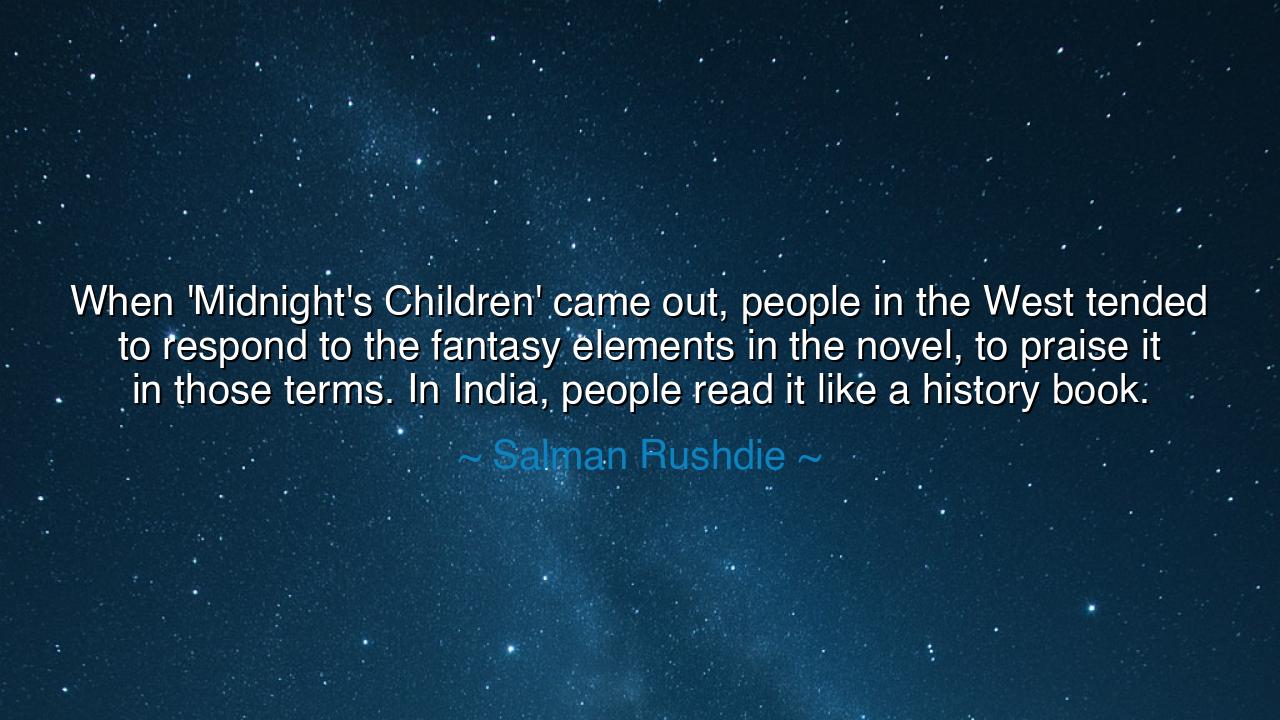
When 'Midnight's Children' came out, people in the West tended to
When 'Midnight's Children' came out, people in the West tended to respond to the fantasy elements in the novel, to praise it in those terms. In India, people read it like a history book.






The great novelist Salman Rushdie, whose pen reshaped the landscape of modern literature, once reflected: “When ‘Midnight’s Children’ came out, people in the West tended to respond to the fantasy elements in the novel, to praise it in those terms. In India, people read it like a history book.” Beneath this quiet observation lies a profound meditation on perspective, culture, and the power of storytelling. Rushdie’s words remind us that a work of art is never fixed—it changes its form depending on the eyes that behold it. What one culture calls fantasy, another calls memory; what one reader calls invention, another recognizes as truth.
When ‘Midnight’s Children’ was published in 1981, it was hailed as a literary miracle. The novel, born of magical realism, told the story of India’s birth through the life of a single man, Saleem Sinai, whose destiny is bound to the very hour of the nation’s independence. To Western critics, the book’s brilliance lay in its imagination—the talking telepaths, the surreal coincidences, the mythic scale. They saw it as a triumph of form, a symphony of creative exaggeration. But to readers in India, the novel was something else entirely. It was not myth but mirror. Its chaos was their history; its absurdity, their reality. The wounds of partition, the disillusionment of postcolonial identity, the echo of voices lost in the tide of time—these were not dreams. They were lived truth.
In his quote, Rushdie captures this duality of perception. He reminds us that art exists in dialogue with its audience, and that every culture brings its own understanding to the page. The West, distanced from India’s turmoil, could afford to see the story as fantasy. But for those whose ancestors had felt the tremors of that midnight hour—the cry of independence, the violence of division, the fragile hope of nationhood—Rushdie’s pages were an act of remembrance. To them, the magical was simply a new language for unspeakable memory. The surreal, for those who lived through chaos, is not invention but revelation.
This divide between imagination and truth has haunted art since the dawn of civilization. The ancient Greeks, in their tragedies, used myth to tell of real suffering—the fall of Troy, the wrath of gods, the folly of kings. To them, the fantastic was a vessel for the real. The Bhagavad Gita, too, is spoken on a battlefield that is both literal and spiritual, its war a metaphor for inner struggle. In this way, Rushdie stands in the lineage of storytellers who know that truth often wears the mask of myth. His “fantasy” is not escape, but exposure—the stripping away of surface to reveal the deeper soul of history.
The origin of his observation lies in his own divided identity. Born in Bombay, educated in England, Rushdie stood at the crossroads of East and West. His life embodied the collision of cultures that shaped his novel. He wrote as one who had seen both sides—the rationalism of Western modernity and the mysticism of Indian tradition. In this position, he understood that perception itself is a product of context. What seems unreal to one mind may be entirely real to another. Thus, when he says that Indians read his book “like a history book,” he honors the depth of cultural memory—the way collective experience transforms fiction into testimony.
From this insight arises a powerful lesson: truth is not singular. It lives in the space between stories and interpretations. The wise reader does not ask, “Is it real?” but rather, “For whom is it real?” In a world of many tongues and histories, art becomes the bridge through which understanding flows. The writer gives form to his vision, but the reader gives it life. Just as Rushdie’s Western readers found magic where Indians found history, so too in our own lives we must learn to see through multiple lenses—to respect the truths that are not our own.
So, my child, remember this teaching: all art is a mirror, but every mirror reflects differently. When you encounter a story, do not rush to define it as fantasy or fact. Ask instead what pain, what memory, what love or loss it seeks to express. For as Rushdie teaches, the boundary between imagination and history is an illusion—woven from the threads of perspective. To understand another culture, another person, even another era, is to learn to see both the dream and the reality entwined. And when you can do that—when you can read the world not only with the eyes of your own experience but with the heart of another—you, too, will hold the magic that turns stories into truth.






AAdministratorAdministrator
Welcome, honored guests. Please leave a comment, we will respond soon